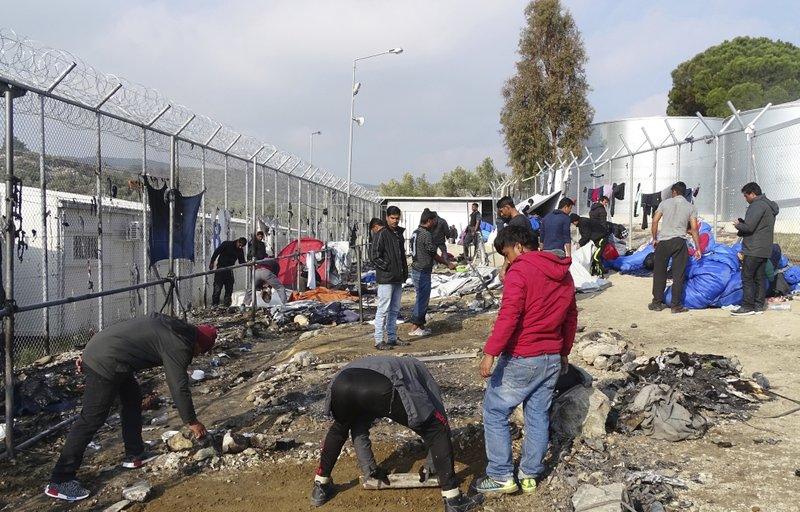ATHENS, Greece -- Greece asked the European Union on Friday to press member states to speed up the relocation of migrants, after a fire raged through an overcrowded refugee camp, killing two people and seriously hurting two others.
Prime Minister Alexis Tsipras said he was "shocked, as is the entire Greek nation, by the tragic event" that occurred overnight at the Moria camp on the island of Lesbos.
The government said it would seek the faster deployment of EU personnel to help process asylum claims. Tsipras' office said he had spoken by phone with European Commission President Jean-Claude Juncker.
A gas canister used for cooking or heating inside a tent started the fire, police said. The victims were a young boy and an older woman, who have not been identified.
Another woman and a second child were severely injured and flown by military plane to Athens, where they were hospitalized in serious condition. Several others were less seriously hurt.
Human-rights groups strongly condemned the loss of life and blamed it on the intransigence and inattentiveness of governments across Europe.
"How many more people need to die in a tent, trying to keep warm, before EU and Greek authorities take action?" said Loic Jaeger, head of mission in Greece for the relief agency Doctors Without Borders.
Moria is one of five Greek island camps sheltering refugees and migrants listed for deportation back to Turkey, under a deal struck between the EU and Turkey in March.
Turkish President Recep Tayyip Erdogan threatened Friday, however, to open the floodgates of migrants into Europe again, apparently in response to a move to suspend talks on Turkey's membership in the European Union.
"You did not keep your word," the president said in a speech, addressing Europe. "You cried out when 50,000 refugees were at the Kapikule border," he said, referring to the border crossing with Bulgaria, one of the busiest crossings in the world even in normal times. "You started asking what you would do if Turkey would open the gates. Look at me -- if you go further, those border gates will be open. You should know that."
The president was referring to an agreement between Turkey and the European Union in which the union gives Turkey up to about $6.3 billion through 2018 in exchange for Turkish cooperation on keeping migrants from crossing into Europe. The agreement mandated an acceleration of talks on Turkey's joining the union, which the European Parliament voted Thursday to suspend. While the vote was nonbinding, Erdogan made clear that he was angered by it.
The agreement has been broadly successful in reducing much of the refugee and migrant flow into Europe this year, with crossings from Turkey dropping below 100 a day recently, compared with 2,000 a day before the agreement, which was signed in March.
Erdogan reminded his listeners, part of an international women's meeting, of Aylan Kurdi, the Iraqi Kurdish toddler whose body was found washed up on a Turkish beach after his family failed to reach Greece by boat, and of Omran Daqneesh, the 5-year-old Syrian boy photographed with his face covered in dust and apparently shellshocked after his home was bombed.
"You did not pick up baby Aylan when he washed up on the shores of the Mediterranean," he said. "You did not pick up babies like Omran. We are the ones feeding in this country 3 million, 3.5 million refugees. You did not keep your promises."
Officials in Europe were quick to insist that the agreement with Turkey was still in effect.
"We consider the EU-Turkey agreement as a common success," a German spokesman, Ulrike Demmer, said at a news conference after Erdogan's remarks. "Threats from both sides will not help now. If there are problems, we must address them. As I have said, this agreement is in the interest of all."
In Brussels, EU authorities continued to work with their Turkish counterparts on carrying out the agreement.
"We are fully committed to the application of that EU-Turkey agreement," Margaritis Schinas, chief spokesman for the European Commission, said at a news conference Friday. The commission, which is the bloc's executive body, expects Europe and Turkey to remain "committed to implementing their respective obligations," Schinas said.
EU member states have accepted fewer than 4 percent of the migrants they are committed to hosting under the bloc's Emergency Relocation Mechanism.
Information for this article was contributed by Elena Becatoros, Derek Gatopoulos and Costas Kantouris of The Associated Press and by Safak Timur, Rod Nordland, James Kanter and Alison Smale of The New York Times.
A Section on 11/26/2016

